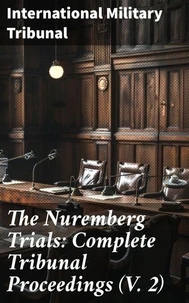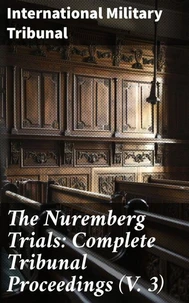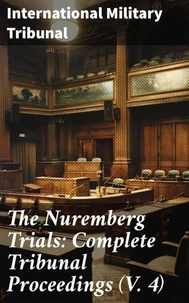The Nuremberg Trials (Volume 1)
Par :Formats :
Disponible dans votre compte client Decitre ou Furet du Nord dès validation de votre commande. Le format ePub est :
- Compatible avec une lecture sur My Vivlio (smartphone, tablette, ordinateur)
- Compatible avec une lecture sur liseuses Vivlio
- Pour les liseuses autres que Vivlio, vous devez utiliser le logiciel Adobe Digital Edition. Non compatible avec la lecture sur les liseuses Kindle, Remarkable et Sony
 , qui est-ce ?
, qui est-ce ?Notre partenaire de plateforme de lecture numérique où vous retrouverez l'ensemble de vos ebooks gratuitement
Pour en savoir plus sur nos ebooks, consultez notre aide en ligne ici
- Nombre de pages331
- FormatePub
- ISBN859-65--4740403-3
- EAN8596547404033
- Date de parution13/11/2022
- Protection num.Digital Watermarking
- Taille506 Ko
- Infos supplémentairesepub
- ÉditeurDIGICAT
Résumé
The Nuremberg Trials (Volume 1) is a meticulous documentation of the unprecedented legal proceedings that established accountability for war crimes following World War II. The text not only presents a comprehensive account of the trials but employs a formal, factual literary style that reflects the solemnity and gravity of its subject matter. Amidst the ruins of a shattered Europe, the trials served as a groundbreaking moment in international law, showcasing the extent of Nazi atrocities and the imperative of justice.
This volume details the prosecution's arguments, the defendants' testimonies, and the judiciary's rigorous deliberations, offering readers valuable insights into the interplay between justice and morality in a post-war world. The authorship of this significant work lies with the International Military Tribunal, a coalition of judges and prosecutors from the Allied powers who were not only legal professionals but also witnesses to the horrors of the Holocaust and the devastating impacts of totalitarian regimes.
Their commitment to establishing a precedent for justice was fueled by a profound sense of urgency to prevent the recurrence of such atrocities, informing their meticulous documentation and interpretation of the trials. This volume is highly recommended for scholars, legal professionals, and history enthusiasts alike. It serves as an essential resource for understanding the complexities of international law and the moral imperatives that drive it.
Engaging with this text allows readers to grasp the foundational principles of justice that arose out of the ashes of war, making it a crucial addition to any academic or personal library.
This volume details the prosecution's arguments, the defendants' testimonies, and the judiciary's rigorous deliberations, offering readers valuable insights into the interplay between justice and morality in a post-war world. The authorship of this significant work lies with the International Military Tribunal, a coalition of judges and prosecutors from the Allied powers who were not only legal professionals but also witnesses to the horrors of the Holocaust and the devastating impacts of totalitarian regimes.
Their commitment to establishing a precedent for justice was fueled by a profound sense of urgency to prevent the recurrence of such atrocities, informing their meticulous documentation and interpretation of the trials. This volume is highly recommended for scholars, legal professionals, and history enthusiasts alike. It serves as an essential resource for understanding the complexities of international law and the moral imperatives that drive it.
Engaging with this text allows readers to grasp the foundational principles of justice that arose out of the ashes of war, making it a crucial addition to any academic or personal library.
The Nuremberg Trials (Volume 1) is a meticulous documentation of the unprecedented legal proceedings that established accountability for war crimes following World War II. The text not only presents a comprehensive account of the trials but employs a formal, factual literary style that reflects the solemnity and gravity of its subject matter. Amidst the ruins of a shattered Europe, the trials served as a groundbreaking moment in international law, showcasing the extent of Nazi atrocities and the imperative of justice.
This volume details the prosecution's arguments, the defendants' testimonies, and the judiciary's rigorous deliberations, offering readers valuable insights into the interplay between justice and morality in a post-war world. The authorship of this significant work lies with the International Military Tribunal, a coalition of judges and prosecutors from the Allied powers who were not only legal professionals but also witnesses to the horrors of the Holocaust and the devastating impacts of totalitarian regimes.
Their commitment to establishing a precedent for justice was fueled by a profound sense of urgency to prevent the recurrence of such atrocities, informing their meticulous documentation and interpretation of the trials. This volume is highly recommended for scholars, legal professionals, and history enthusiasts alike. It serves as an essential resource for understanding the complexities of international law and the moral imperatives that drive it.
Engaging with this text allows readers to grasp the foundational principles of justice that arose out of the ashes of war, making it a crucial addition to any academic or personal library.
This volume details the prosecution's arguments, the defendants' testimonies, and the judiciary's rigorous deliberations, offering readers valuable insights into the interplay between justice and morality in a post-war world. The authorship of this significant work lies with the International Military Tribunal, a coalition of judges and prosecutors from the Allied powers who were not only legal professionals but also witnesses to the horrors of the Holocaust and the devastating impacts of totalitarian regimes.
Their commitment to establishing a precedent for justice was fueled by a profound sense of urgency to prevent the recurrence of such atrocities, informing their meticulous documentation and interpretation of the trials. This volume is highly recommended for scholars, legal professionals, and history enthusiasts alike. It serves as an essential resource for understanding the complexities of international law and the moral imperatives that drive it.
Engaging with this text allows readers to grasp the foundational principles of justice that arose out of the ashes of war, making it a crucial addition to any academic or personal library.





